August 30, 1907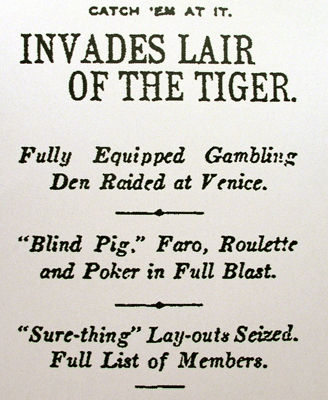
Venice
Get talked up by a booster…wend your way through the hall…step on the special stair which emits a loud buzz, warning those you approach. You’re one your way into the Venice Club, Windward Avenue, Venice, California.
The windows are covered in black oilcloth to keep out light and sound and prying eyes. Inside there’s a roulette wheel, stacked high with gold and silver, emitting its seductive clicky whir, counterposed by the atonal, plangent clack of chips. Verdant young society men huddle around the faro layout. You may or may not notice—they’re all losing. Certainly your luck can’t be as bad!
Your luck would be bad indeed this night, as Deputy District Attorney John North kicks in the door and announces that everyone is under arrest. This would not phase the roulette dealer: “He looked coldly at the officers and his slender gambler fingers toyed idly with the stack of chips at the edge of the table; his little, ratty, sharp face was a slight sneer, half of amusement.”
The Venice Club, run by an aggregation of Arizona sure-thing men, is as crooked as they come. It is said that the reason the faro dealer has one eye is due to time spent having to look crooked at the bent ends of marked cards.
As the room was pinched, a sudden epidemic of sick wives befell Los Angeles. But the cops would have none of it, and everyone was hauled in. The gamblers were allowed to kitty their boodle—some $1486 ($30,498 2006 USD).
The club kept a register of all the tenderfoot gilded youth they’d fished, and, amusingly, the paper printed it in full:
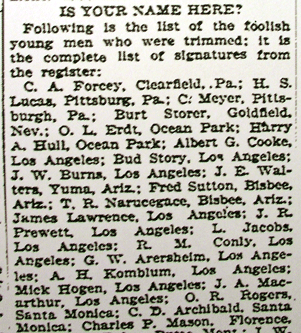
Ah, would that the story should end there. The bust of the Venice Club opened wide a scandal that shed no new good light on the already suspect “beach towns.”
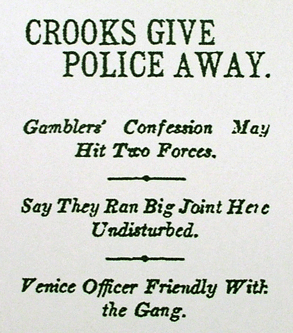
The Venice police were as fixed as the card games, and got fat from the brace games that lined the seashore. (During Fiesta week, the same underworld figures who ran the Venice Club ran a crooked [and police protected] gambling hall downtown on Broadway between First and Second.) Venice men “higher up” had cemented relationships with blind pigs, dens of ruination for young girls, and that special element adept in fixing elections. Abbot Kinney and (Ocean Park magnate) G. M. Jones battled it out and the cops pledged their various allegiances in the war.
The corruption scandal lingered long and luscious…September 11, 1907:
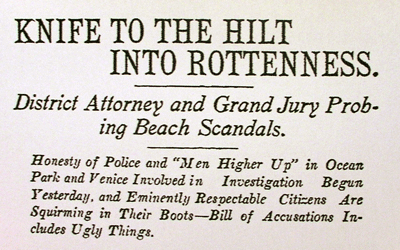



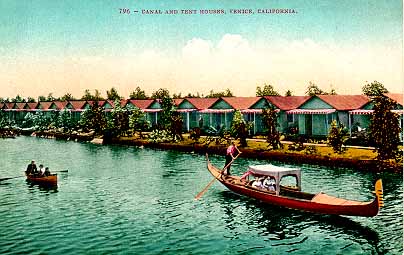

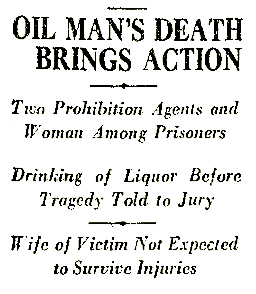
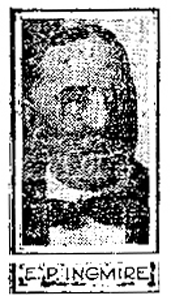 Normally, drunken vehicular homicides under the auspices of Volstead-Feds get swept under the rug, but unfortunately Ingmire was former president of the
Normally, drunken vehicular homicides under the auspices of Volstead-Feds get swept under the rug, but unfortunately Ingmire was former president of the 

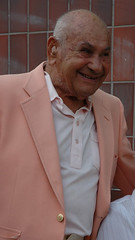 But enough about crime. Please join us, gentle reader, in wishing a most joyous 95th birthday to the beaming gentleman at left, Mr. Harry Cooper, my grandpa. Born in Philly in 1912, he served in Havai’i (as he pronounces it) during the early 1930s where he saved a fellow soldier from a riptide, came out to LA and drove a pickle truck, met and wooed my grandma Barbara on the tennis courts, and together they briefly ran a chicken ranch, then were for many years in the discount shoe business at the Beverly Bootery, a shop located where the El Coyote parking lot is today. Harry is a gentle fellow with a passion for tinkering in his garage workshop (ask him about his moss topiary projects or the steering wheel shelf he made so he can read National Geographics in the car while Barbara is shopping), odd scientific and natural history facts, golfing and exotic foods. Here’s wishing a perfect day to a lovely fellow!
But enough about crime. Please join us, gentle reader, in wishing a most joyous 95th birthday to the beaming gentleman at left, Mr. Harry Cooper, my grandpa. Born in Philly in 1912, he served in Havai’i (as he pronounces it) during the early 1930s where he saved a fellow soldier from a riptide, came out to LA and drove a pickle truck, met and wooed my grandma Barbara on the tennis courts, and together they briefly ran a chicken ranch, then were for many years in the discount shoe business at the Beverly Bootery, a shop located where the El Coyote parking lot is today. Harry is a gentle fellow with a passion for tinkering in his garage workshop (ask him about his moss topiary projects or the steering wheel shelf he made so he can read National Geographics in the car while Barbara is shopping), odd scientific and natural history facts, golfing and exotic foods. Here’s wishing a perfect day to a lovely fellow! 



